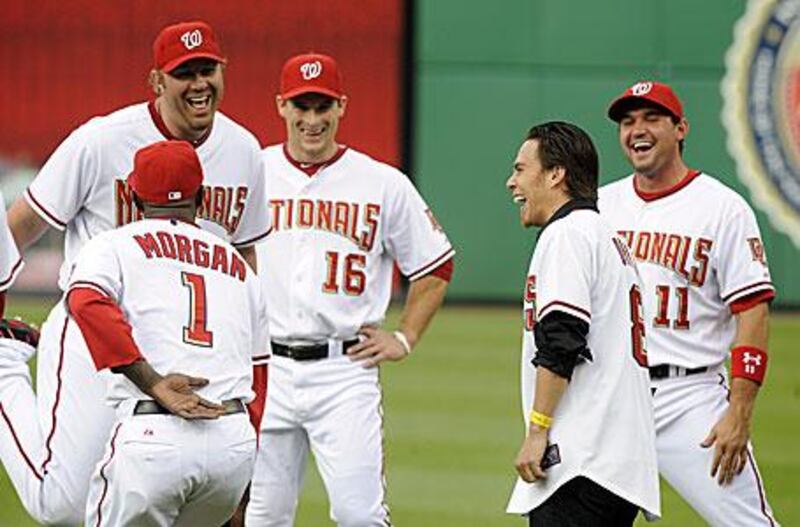Hours before each of their actual games, about a dozen members of the Washington Nationals form a circle in front of their dugout, like kids playing Hacky Sack at recess, to play a different kind of game. Most are players, a few are coaches. Some speak Spanish, some speak English. All of them, by the end, are laughing. The game, imported from Latin American winter ball leagues, is called "Flip". Using their gloves, players throw a baseball at one another. When the ball hits the ground, the responsible party is eliminated. The knockouts continue until one player remains, a process filled with playful taunting and capped with jocular boasting.
The popularity of Flip is notable for one reason in particular: "We didn't do anything like that last year," Justin Maxwell, the out-fielder, said. The Nationals got together in late February, an infusion of veterans mixing with young players who rose together through the Nationals' farm system. They soon learned an elemental aspect of their team: they liked one another. By the end of spring training, the Nationals had developed a clubhouse-wide closeness lacking in recent seasons.
"We're a unit," Nyjer Morgan, the centre fielder said. "We all believe in each other. You can see the difference." As the 13-12 Nationals produced one of baseball's most surprising starts, their closeness manifested in several ways. After victories, they pass around a goofy, silver Elvis wig, a left over from Morgan's Halloween costume, which he turned into a team-building totem. Large groups of teammates eat dinners out together after day games.
"The whole clubhouse atmosphere is way better than it was last year," Maxwell said. "It's just the personalities that we have. It's a lot more fun coming to the ballpark every day. Winning makes everybody happy, but it's probably more the quality of individuals that we have on the team." Without question, their success so far has helped facilitate their chemistry. At this point in the 2009 season, the Nationals had already lost any hope of contention. Injuries and ineffectiveness had blown up the roster.
"Last year, there was a lot of guys moving in and out," Tyler Clippard, the reliever, said. "There was a lot of guys struggling, not performing, and people second-guessing everybody because of that. Right now, there's none of that going on. It's contagious." The change began in spring training. New additions such as Ivan Rodriguez, Adam Kennedy and Livan Hernandez provided an aura of legitimacy and an example to be followed. First, they had to feel one another out. "Guys like Pudge, who you've played against for a while and you're not sure what they're like, really," Kennedy said. "They open up early, and it helps."
One crucial moment occurred late in March, when Jim Riggleman, the manager, named Ian Desmond, a rookie, the starting shortstop over Cristian Guzman. A starter his whole career, Guzman could have sulked and perhaps created a rift. Instead, Guzman that day took groundballs at second base without complaint. Guzman had known Desmond since Desmond's first spring training in 2005, when he arrived as a touted 19-year-old. Guzman looked out for Desmond then and through his minor league career.
At first, Desmond wondered how Guzman would react to him; he had, after all, taken his job. Without saying a word, Guzman made clear his demotion left their relationship unchanged. They went through double plays together and high-fived at the end of the drill. "We're friends," Desmond explained at the time. "He's my buddy." During the season, Desmond, Guzman and Kennedy have formed a three-man rotation in the middle in-field. They have spoken about the situation but only briefly, never contentious.
Before each game, the player chosen for the bench that day assists the others with pregame defensive drills. "I think other people see that," Kennedy said. "Things like that bring us all together." Baseball's marathon season stretches and grinds every facet of a team, constantly threatening to turn bonds into fissures. The middle in-field harmony, surely, will be tested. Guzman has 88 plate appearances, fourth most for the Nationals, but many of those came because of the prolonged absencewith hamstring injuires of Ryan Zimmerman, the third baseman.
Riggleman wants to play Desmond more than twice every three games, and so Guzman may find fewer available at-bats as the season wears on. "Whenever we hit our little rough spell, if we hit one, that'll tell what we have character-wise," Willie Harris, the utility man, said. The notion of team chemistry can be nebulous, its advantages debated. "It's not going to help you get pitching or score any runs," Josh Willingham, the left fielder, said. Maybe, though, it can help. If discord besieges a team, Riggleman said, "it's probably going to show up in the standings eventually."
"When you have fun, you're more relaxed." Maxwell said. "When you're more relaxed, you play a little bit better. * The Washington Post





